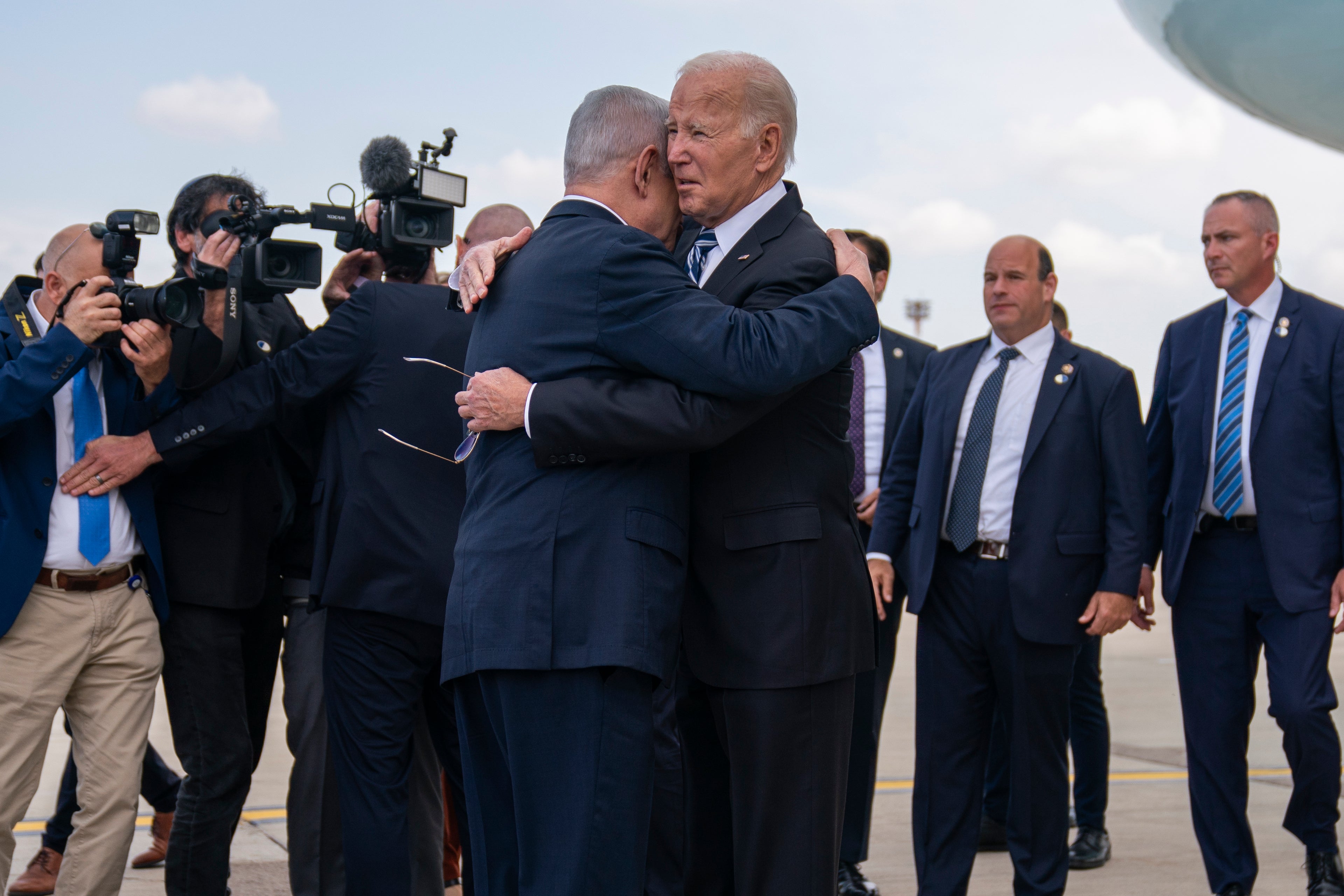How the most important diplomatic trip of Biden’s presidency was almost derailed
Biden visit was aimed at demonstrating support for Israel and calming fears of a wider war

Twenty-four hours ago, it looked like there was little reason for President Joe Biden to follow through on his pledge to visit Israel and Jordan after meetings with a trio of Arab leaders were called off in the wake of an explosion which had rocked the Al-Ahli Arabi Baptist Hospital in Gaza.
Mr Biden had been set to meet with King Abdullah II of Jordan, President Fattah El-Sisi of Egypt and Palestinian Authority president Mahmoud Abbas before the blast, which may have killed upwards of 300 people.
But as he traveled by motorcade to Air Force One, it was announced that the second leg of the trip — set to occur after Mr Biden met with Israeli leaders in Tel Aviv — had been canceled, leaving just the opening part in Israel remaining on his agenda.
The king, Mr El-Sisi and Mr Abbas had all pulled out on account of the blast, which initial reports — based on claims by Palestinian officials in Gaza — had attributed to an Israeli airstrike on the hospital, a protected location under international law.
The development had the potential to derail one of the most important diplomatic trips of Mr Biden’s presidency. By meeting Arab leaders, the president had hoped to calm fears of an escalation that could widen the war and draw in regional powers.
At home, left-wing voices on the fringes of Mr Biden’s Democratic Party had grown louder and more emboldened to speak out against US support for Israel in the wake of the explosion, with some in Congress such as Palestinian-American Rep Rashida Tlaib of Michigan tweeting out statements that aligned with Hamas’ version of what had happened.
Yet by the time he landed at Ben Gurion Airport in Tel Aviv, the facts began to come out and shift things in the US president’s — and in Israel’s — favour.
Both the Israeli Defence Forces and US intelligence spent the hours while the president was in the air pouring over available evidence, including video from news cameras mounted around Gaza and from radio intercepts of Hamas militants.
What they found was that the thing that had set off the deadly explosion was not an Israeli munition of any type. In fact, both the IDF and the US National Security Council have now assessed that the blast was touched off by a botched rocket launch by Palestinian Islamic Jihad.

Or in the words of Mr Biden upon landing and greeting Israeli Prime Minister Benjamin Netanyahu, it was “the other team” that had killed hundreds of vulnerable Palestinians while they sheltered at a hospital.
So while much of the Arab world chose to accept the word of Hamas, which has been designated as a terrorist organisation by the US for decades, the broader world saw the US president, fresh off Air Force One, make clear that it was not Israel which had blown up a hospital.
That use of the bully pulpit and the unique media bubble that follows a sitting president wherever he goes might have been enough of a win for Mr Biden, but he followed it up with an even bigger breakthrough when he met with Mr Netanyahu’s war cabinet.
He made the announcement during remarks at the conclusion of his trip, in which he stressed that the US stands with the Palestinian people — not the terrorists, but the innocent people of Gaza and the West Bank — as much as it does with Israel, an ally since that country’s founding.
Noting that the people in Gaza still need live-saving provisions of food, water, medications and shelter, Mr Biden said he’d asked Israel’s war cabinet to allow humanitarian aid to pass through the Rafah border crossing between Egypt and Gaza, which has remained closed despite the best efforts of US diplomats.
They said yes.
“Based on the understanding that there will be inspections and that the aid should go to civilians, not to Hamas, Israel agreed that humanitarian assistance can begin to move from Egypt to Gaza,” he said, adding later that a $100 million aid package from the US would be delivered to support critical needs in Gaza and the West Bank.
The White House later told reporters aboard Air Force One that Egyptian President El Sisi has agreed to open up the Rafah crossing to allow up to 20 trucks of humanitarian aid into Gaza.
Israel’s current government is the most right-wing in the nation’s 75-year history. The current prime minister has spent years meddling in US politics, most often to the detriment of members of Mr Biden’s party.
Yet in visiting Israel in the wake of the tragic hospital explosion, Mr Biden was able to set the record straight about what happened in Gaza on Tuesday and convince that right-wing government to allow humanitarian aid to people who members of that government have condemned as less than human.
At a time when support for Israel still commands large majorities in both chambers of Congress, making a point of stressing the need to support the Palestinians’ humanitarian needs might not seem like a popular choice.
But Mr Biden was willing to put some of his political capital at risk to get the Israelis to do the right thing. And for whatever reason, they agreed to do it.
Join our commenting forum
Join thought-provoking conversations, follow other Independent readers and see their replies
Comments
Bookmark popover
Removed from bookmarks